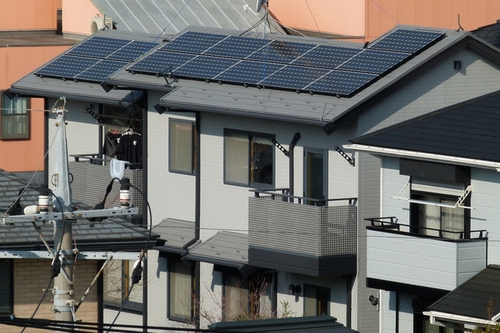February 16, 2014
Nine Municipalities in Tokyo Area Press Gov't to Promote Solar Power
Keywords: Local government Renewable Energy

Image by CoCreatr. Some Rights Reserved.
The Nine Municipal Government Leaders' Summit, composed of the heads of the Tokyo Metropolis, which includes the four prefectures Tokyo, Saitama, Chiba, and Kanagawa and five major cities in the area, submitted, on November 26, 2013, a request to the Japanese government asking it promote the installation of photovoltaic (PV) power generators at business office sites.
Their request comprises two parts. One is to set a new cost and classification system for power purchasing that would allow PV facilities with an output on the order of tens of kilowatts, which is the size most commonly installed at business offices, to be as profitable as larger installations. The other is to establish laws that would help ensure the continuity of PV power generation businesses, such as by establishing a system for registering lease rights pertaining only to the roofs themselves, separate from the buildings, thus reducing risk in cases where, say, the PV facilities are installed on the roof of a private business office building and the owner of the building goes bankrupt.
The Summit made the request based on its recognition that greater focus should be placed on PV power among renewable energies it has greater economic potential for introduction and faces lower barriers in terms of the geographical distribution of resources and installation site conditions. Currently, most new PV capacity comes from megawatt-scale solar farms developed on open tracts of unused land. The Summit claims that, for further development of PV generation, it is essential to promote the installation of facilities with less than 1,000 kilowatts in output on private business sites.
The Nine Municipal Government Leaders' Summit, which meets twice a year, was established as a system to facilitate cooperation and collaboration among municipalities so they can respond adequately to increasing decentralization of government authority and growing diversity and complexity of regional issues. Its activities include policy advocacy and awarding industrial technologies.
Related
"JFS Newsletter"
- 'Yumekaze' Wind Turbine Project Connects Metro Consumers and Regional Producers: Seikatsu Club Consumers' Co-operative
- Shaping Japan's Energy toward 2050 Participating in the Round Table for Studying Energy Situations
- Nishiawakura's Initiative for 100% Energy Self-Sufficiency, and a Municipal ICO Scheme
- Actions Toward 100% Renewable Energy in Japan
- Sustainable Community Building in Shimokawa: Recycling-Oriented Forest Management Enabling Permanent Use of Forest Resources
Related
"Popular Articles"
- Current Status of Renewable Energy in Japan (2015)
- Offshore Wind Farm Withstands Great East Japan Earthquake and Tsunami
- Current Status of Renewable Energy in Japan (2014)
- Geothermal Power: Japan Has World's Third Largest Geothermal Reserves, 60 Percent of Which Can Be Developed
- Tokyo Plans to Increase Renewable Energy Ratio to 20% by 2024


